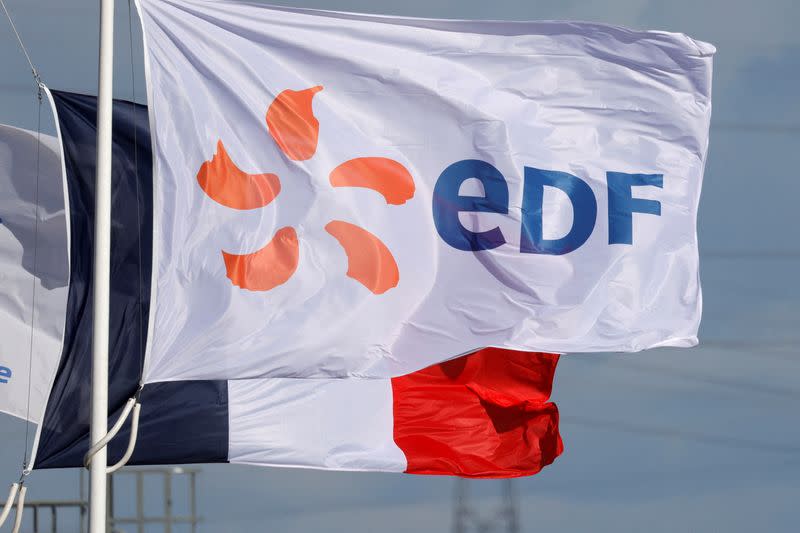France to pay $10 billion to take full control of EDF
By Mathieu Rosemain and Leigh Thomas
PARIS (Reuters) -France's government is offering to pay 9.7 billion euros ($9.85 billion) to take full control of EDF, in a buyout deal that gives it a free hand to run Europe's biggest nuclear power operator as it grapples with a continent-wide energy crisis.
The finance ministry said in a statement on Tuesday that the government would offer EDF's minority shareholders 12 euros per share, a 53% premium to the closing price on July 5, the day before the government announced its intention to fully nationalise the debt-laden group.
EDF shares, which resumed trading on Tuesday after a one-week suspension pending details of the government buyout plan, had jumped 15% to 11.80 euros by 0836 GMT.
The state already owns 84% of EDF, which has been dogged by unplanned outages at its nuclear fleet, delays and cost overruns in building new reactors, and power tariff caps imposed by the government to shield households from soaring electricity prices.
The war in Ukraine has deepened the crisis at the group, forcing it to buy electricity on the market at historically high prices and sell it at cheaper levels to its competitors.
France has said EDF's nationalisation will increase the security of its energy reserves as Europe scrambles to find alternatives to Russian gas supplies.
Rising prices have squeezed energy suppliers across Europe, and earlier this month Germany moved to bail out Uniper, its biggest importer of Russian gas.
France, which would normally be exporting electricity at this time of the year, is currently importing from Spain, Switzerland, Germany and Britain, and the supply crunch is likely to worsen this winter.
"Nationalisation is ultimately the only way to save the company and ensure electricity production," said Ingo Speich, head of sustainability and corporate governance at Deka Investment, which has a small stake in EDF. "This is a bitter but necessary step."
With rating agency S&P estimating EDF's debt could reach close to 100 billion euros this year, a bondholder in the group said the proposed buyout was a welcome signal of support from the government.
However, far more needed to be done to stabilise the balance sheet, the bondholder added.
A banker with knowledge of the matter said that the state, which provided the bulk of a 3 billion euro capital increase for EDF in the spring, will likely have to inject more money soon.
EDF was listed on the Paris stock exchange in 2005 at 33 euros per share, so investors who bought the stock then would be nursing a big loss.
Still, analysts noted the government would only need to get 90% ownership of EDF to be able to delist it.
"We think the offer looks attractive and has high probability of success," Citi analyst Piotr Dzieciolowski said in a note.
The buyout offer will be filed with the stock exchange regulator by early September. The French government aims to complete the process of delisting the group by the end of October, a finance ministry source said.
Sources told Reuters last week the government would pay close to 10 billion euros to buy the 16% of EDF it did not already own, once taking into account outstanding bonds and a premium for minority shareholders.
($1 = 0.9846 euros)
(Additional reporting by Dominique Vidalon, Elizabeth Pineau and Julien Ponthus in Paris, Carolyn Cohn in London; Writing by Silvia Aloisi; Editing by Jan Harvey)

 Yahoo Finance
Yahoo Finance 

